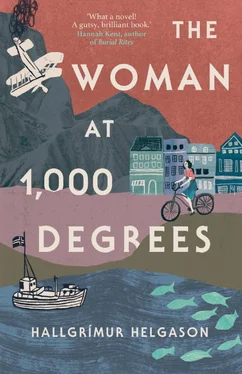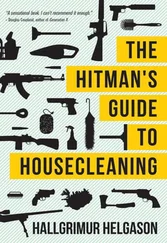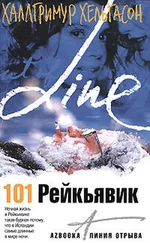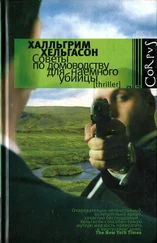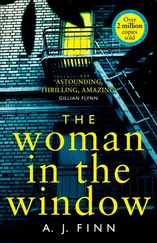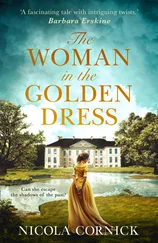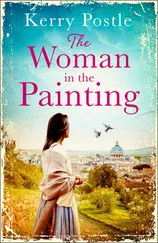But now he was slowly recovering his senses. Now he was beginning to recognise his surroundings. The boat carried them over the tranquil river, a hundred Russian soldiers. He stood watching the bridge, contemplating the ruins, bare pillars and shattered floors, and remembered passing it three years earlier as a ‘young’ soldier on his way to the east, heading for the highest echelons of the Nordic Studies faculty of the University of Moscow. There were just a few details that had to be dealt with first. And now he was on his way back to Germany on a slow boat marked with a red star. He had ploughed through bloody fields, shot into the eye of war, lost one friend after another, and seen the fire inside Hitler’s soul, smelled its stench, the stench of Hitler’s ideals and his own, but it wasn’t until this moment that he saw the total futility of war.
The World War had achieved nothing, brought nothing. Nothing had been won, nothing gained. Germany was still Germany, and Russia Russia. Between them lay Poland. Tanks had pushed borders to the east and west, but soon everything would fall back into their original positions. Because within a few weeks it would all be over. After years of clashes with guns and steel, everything was to be the same again. All that had happened was that the bridge had broken. The river was the same, the trees the same, the sky the same. Nothing had changed but the bridge. It was broken.
Yes, of course, 50 million lives had been lost. Or was it 70? What’s 20 million between friends? Yes, that’s 160 Icelands.
Now they were inside Hitler’s Germany, and Dad had stopped talking. He said nothing else. His brothers in arms, however, cursed every field and every tree and spat on every stone. On the first night they stayed on a wealthy-looking estate, which the owners hadn’t had time to burn, except for the bread in the oven. All the cupboards were full here, the buildings dry, and all the furniture palatially luxurious. Even the stables were more elegant than the hovels back home. All that Teutonic order deeply irritated the Russian soldiers. They stomped through the rooms with their guns in a rage, ripping paintings off the walls and kicking furniture. Their fury reached its peak in the pantry: one of the comrades stormed back into the kitchen, flour white, yelling, ‘Why the fuck did they have to invade Russia!? They had everything here!’
He then grabbed a four-pound loaf of rye bread and started beating it against the wall, cursing until the loaf broke and he himself burst into tears, falling on his knees on the red tiles, invoking his mother, wife and daughter.
‘ Mamushka, mamushka… Dashenka, Dashenka… ’
Three hours later they were all full and dead drunk. They congregated in the toilet while Dad sat in the kitchen. They had never seen a water closet, and one of them washed his face in it. How about that! Dad stared into his glass, wondering where his daughter was now. No, she was safe with her mother in Lübeck. They’d had luck on their side. Hadn’t the town been liberated? Oh, Massa, oh, Massa. Come to me with your great thighs.
At midnight, two privates appeared, a tall and a short one, clasping two German girls with quivering lips and weeping eyes. They were dragged into the living room and thrown on the table. It all started with the shrieks and cries of the girls but ended in their total silence. Dad didn’t know which was worse, but sat through it all staring at his fingers, five and five. His intellectual hands had turned into those of a gladiator. Was he perhaps the first Icelander in eight centuries to have turned into such a… murderer? Had he killed a man? Yes, probably in the battle alongside the Dniester, the first one. Suddenly a soldier reentered the kitchen, buttoning up his trousers before he collapsed on a chair by the table full of glasses, shaking his head and muttering to himself.
‘Ne mogu, nikak ne mogu … I can’t… fuck, I can’t… that… fucking hell…’ Then he looked at Dad and held out a glass. ‘But I can drink! I can drink their fucking schnapps even if I can’t screw their women! Fucking, fucking Germany! May it be damned for eternity! Vypjem! ’
Dad raised his glass.
‘You don’t say anything, Hans. Have you lost your tongue?’
‘What tongue?’
It can undoubtedly be considered a privilege to have been able to walk into Berlin in the spring of 1945 and experience the beauty of its annihilation. And the freedom of despair.
What appeared was the skeleton of a city. Empty eye-sockets, gaping ribs and broken bones. The sun shone through the stone walls that still stood. Entire neighbourhoods had been transformed into heaps of rubble, and the streets were little more than hollow tracks between them. But in the public parks, God continued his tasteless comedy routine by allowing the trees to bloom and flowers to sprout out of the earth and filling them all with chirping birds.
Black-clad creatures scuttled across the streets like rats. We were all in the same boat: searching for food. Dark jets of smoke billowed in the distance, and somewhere the war still hissed like a wounded dragon trapped down a blind alley. On the corner a soldier lay face-down in a fancy uniform, and up against a wall sat a sleeping woman beset with flies. On the third floor a fire waved through a window.
Occasionally one could hear the sound of a collapsing building or an air-raid siren, but no one paid any heed. And somewhere, someone was playing an accordion, that resilient instrument that resounds on the most momentous occasions of European history.
A tank appeared at the corner and crawled down the road like some prehistoric beast, but no one tried to distinguish whether it bore a Nazi cross or a star. An arm protruded from the caterpillar track on its right side and followed the circular tread, up off the street and down again, like a tragicomic flag. We were all, like the city itself, on our last legs, numbed by the carelessness that takes over when prolonged fatigue is drawing to an end. When you’ve had to struggle to survive every day of your life for so many years and victory is finally in sight, you’re suddenly overwhelmed by indifference.
I clambered over crumbled walls, having lost track of those two thousand people I’d encountered on my journey across Poland. And I didn’t have a door to knock on, because there were no doors left. But I had more than many others: a plan and travelling funds; the name of an American man; and a rare pearl in my pocket. Maybe I was the richest girl in Berlin.
I asked for directions, slowly approaching the street. The neighbourhood was a mound of debris. A hunched woman was rummaging through the ruins for food and looked up when I asked her. With a cleft lip she answered, ‘I think Bühlstraße was there where that building stands,’ pointing out over the cluster of stones: a distant flat-roofed house stood in the wreckage like a summerhouse in the countryside. The spring sun shone on this entire tragedy like a housewife who switches on the light in the middle of a late-night party, making it shine with evil intensity on a mayhem of vomit and broken glass: although I welcomed the good weather after the long winter, it irritated me just as much as the darned birdsong. I scrambled towards the building as if I were crossing an Icelandic lava field. It was a classical two-storey building with damaged walls and two pillars in front of the door. In front of its four steps stood a guard in a long coat.
He was a tall German soldier, but obviously one of those dimwits who had been left at home, like that oaf Hans at the Hamburg station. He was sweating out his last days in the war there under the sun; drops trickled down from the shadow cast by his helmet. I asked him whether this was Bühlstraße and he answered yes. Then whether a certain Hauptmann lived here and he said no. The warty Swede had said that the American’s code name was Gerhard Hauptmann.
Читать дальше
